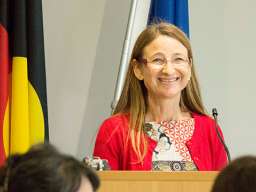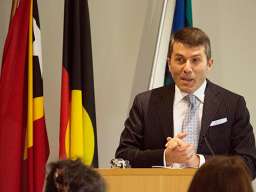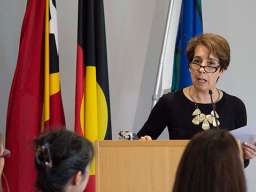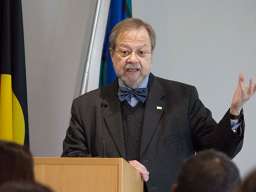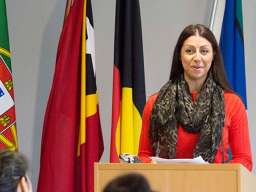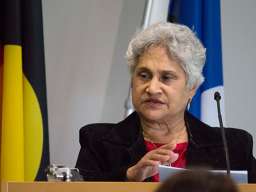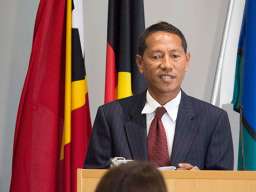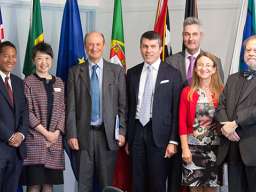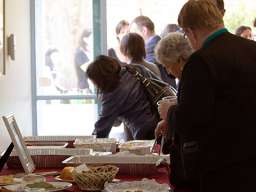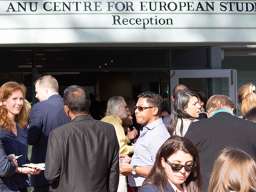ANU and Embassies gather to celebrate Portuguese Languages and Culture
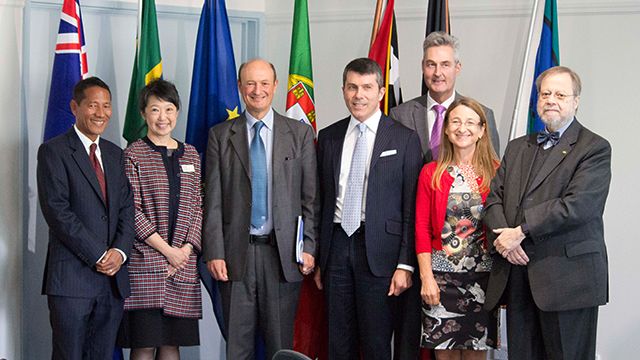
Representatives from the ANU and embassies of Portuguese-speaking countries celebrate the Day of the Community of Portuguese Language
The annual celebration of the Day of the Community of Portuguese Language countries has been celebrated with interesting talks, good company and terrific food at the ANU Centre for European Studies.
The event was hosted by the ANU School of Literature, Languages and Linguistics and the Australian National Centre for Latin American Studies (ANCLAS). In attendance were His Excellencies the Ambassadors Paulo Cunha-Alves (Portugal) and Manuel Innocencio de Lacerda Santos Jr. (Brazil). Mr Domingos Savio represented the Timor-Leste Ambassador, His Excellency Abel Guterres.
Director of ANCLAS, Dr Elisabeth Mayer, opened proceedings, quoting philosopher Ludwig Wittgenstein.
"The limits of my language means the limits of my world," said Dr Mayer, adding that ANU is the only tertiary institute in Australia that teaches Portuguese.
The first speaker, Isabel D’Avila, discussed her novel about the acclaimed Portuguese composer Luís de Freitas Branco. Branco was married to her great aunt, and her mother used to regale Ms D’Avila with stories about the eccentric and brilliant composer. These stories led to Ms D’Avila’s book Dona Stella and her rivals.
Kate Ticehurst, Director of the Subsdance Dance Studio, spoke about why Carnaval is about much more than the feathers.
"There’s a lot of cultural misunderstanding about the feathers and costumes," Ms Ticehurst said, referring to the misplaced sexual connotations about what Samba dancers wear.
"Samba is for everyone – the young and old, soccer stars, children, men and women."
She added, "Carnaval is a celebration of freedom."
The third speaker, Mécia Freire, explained the Portuguese influence on her hometown of Goa, India.
The former Portuguese colony is one of the smallest Portuguese-speaking areas in the world, she said.
Goa was made India's twenty-fifth state in 1987, and now only older generations speak Portuguese at home.
"We still use words and celebrate customs no longer in use in Portugal," Mrs Freire said.
The Portuguese influence is evident in Goan food – such as Vindaloo. Mrs Freire explained the etymology: "Vinho is wine in Portuguese and Alho is garlic. Marinated in wine and garlic."
The final speaker, Mr Domingos Savio, played a presentation about Timor-Leste. The country is young, both as an independent nation as of 2002 and in demographics: more than 60% of its population are under 25 years of age.
Mr Savio talked about the country’s similarities with Portugal, citing football as one of its most popular sports. Portugal is one of Timor-Leste’s allies and its main supporter, he added.
After the formal speeches, guests enjoyed Portuguese foods provided by the three embassies.
